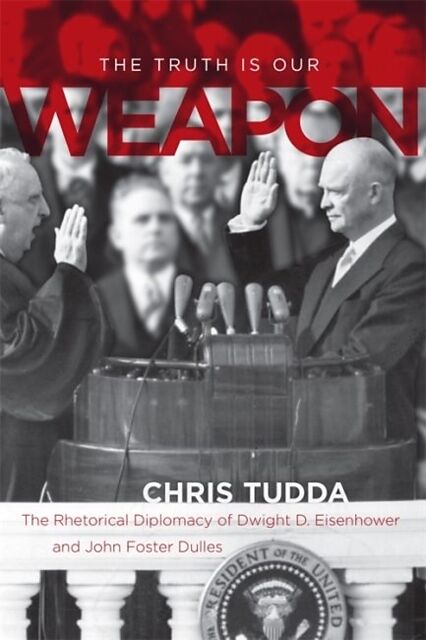The Truth Is Our Weapon
Einband:
Fester Einband
EAN:
9780807131404
Untertitel:
The Rhetorical Diplomacy of Dwight D. Eisenhower and John Foster Dulles
Genre:
Politikwissenschaft
Autor:
Chris Tudda
Herausgeber:
Lsu Press
Anzahl Seiten:
240
Erscheinungsdatum:
01.05.2006
ISBN:
978-0-8071-3140-4
Informationen zum Autor Chris Tudda is a historian with the U.S. Department of State. He lives in Arlington, Virginia. Klappentext President Dwight D. Eisenhower and his secretary of state, John Foster Dulles, deployed a tactic Chris Tudda calls "rhetorical diplomacy"-- sounding a belligerent note of anti-Communism in speeches, addresses, press conferences, and private meetings with allies and with Moscow. Yet all the while, Tudda discloses, the two were confidentially committed to a contradictory course--the establishment of a strong system of collective security in Western Europe, peaceful accommodation of the Soviet Union, and the maintenance of a new, albeit divided Germany. Tudda explores the Eisenhower administration's pursuit of these two mutually exclusive diplomatic strategies and reveals how failure to reconcile them endangered the fragile peace of the 1950s. He builds his argument through three case studies: of the administration's badgering the French and their allies to ratify the European Defense Community, of its threat to liberate Eastern Europe from Moscow's rule, and of its forcing the issue of German reunification. By emphasizing the threat from the Soviet Union, Eisenhower and Dulles were trying to promote an activist rather than an isolationist foreign policy. But their rhetorical diplomacy intensified Cold War tensions with European allies as well as with Moscow and effectively overwhelmed the administration's true diplomatic aims. Based on American, British, Eastern European, and Soviet primary sources--many only recently unearthed-- The Truth Is Our Weapon is a major contribution to the historiography of Eisenhower's diplomacy and an important statement about the implications of public and private policy making.
Klappentext
President Dwight D. Eisenhower and his secretary of state, John Foster Dulles, deployed a tactic Chris Tudda calls "rhetorical diplomacy"-- sounding a belligerent note of anti-Communism in speeches, addresses, press conferences, and private meetings with allies and with Moscow. Yet all the while, Tudda discloses, the two were confidentially committed to a contradictory course--the establishment of a strong system of collective security in Western Europe, peaceful accommodation of the Soviet Union, and the maintenance of a new, albeit divided Germany. Tudda explores the Eisenhower administration's pursuit of these two mutually exclusive diplomatic strategies and reveals how failure to reconcile them endangered the fragile peace of the 1950s. He builds his argument through three case studies: of the administration's badgering the French and their allies to ratify the European Defense Community, of its threat to liberate Eastern Europe from Moscow's rule, and of its forcing the issue of German reunification. By emphasizing the threat from the Soviet Union, Eisenhower and Dulles were trying to promote an activist rather than an isolationist foreign policy. But their rhetorical diplomacy intensified Cold War tensions with European allies as well as with Moscow and effectively overwhelmed the administration's true diplomatic aims. Based on American, British, Eastern European, and Soviet primary sources--many only recently unearthed--The Truth Is Our Weapon is a major contribution to the historiography of Eisenhower's diplomacy and an important statement about the implications of public and private policy making.

Leider konnten wir für diesen Artikel keine Preise ermitteln ...
billigbuch.ch sucht jetzt für Sie die besten Angebote ...
Die aktuellen Verkaufspreise von 6 Onlineshops werden in Realtime abgefragt.
Sie können das gewünschte Produkt anschliessend direkt beim Anbieter Ihrer Wahl bestellen.
Loading...
Die aktuellen Verkaufspreise von 6 Onlineshops werden in Realtime abgefragt.
Sie können das gewünschte Produkt anschliessend direkt beim Anbieter Ihrer Wahl bestellen.
| # | Onlineshop | Preis CHF | Versand CHF | Total CHF | ||
|---|---|---|---|---|---|---|
| 1 | Seller | 0.00 | 0.00 | 0.00 |
